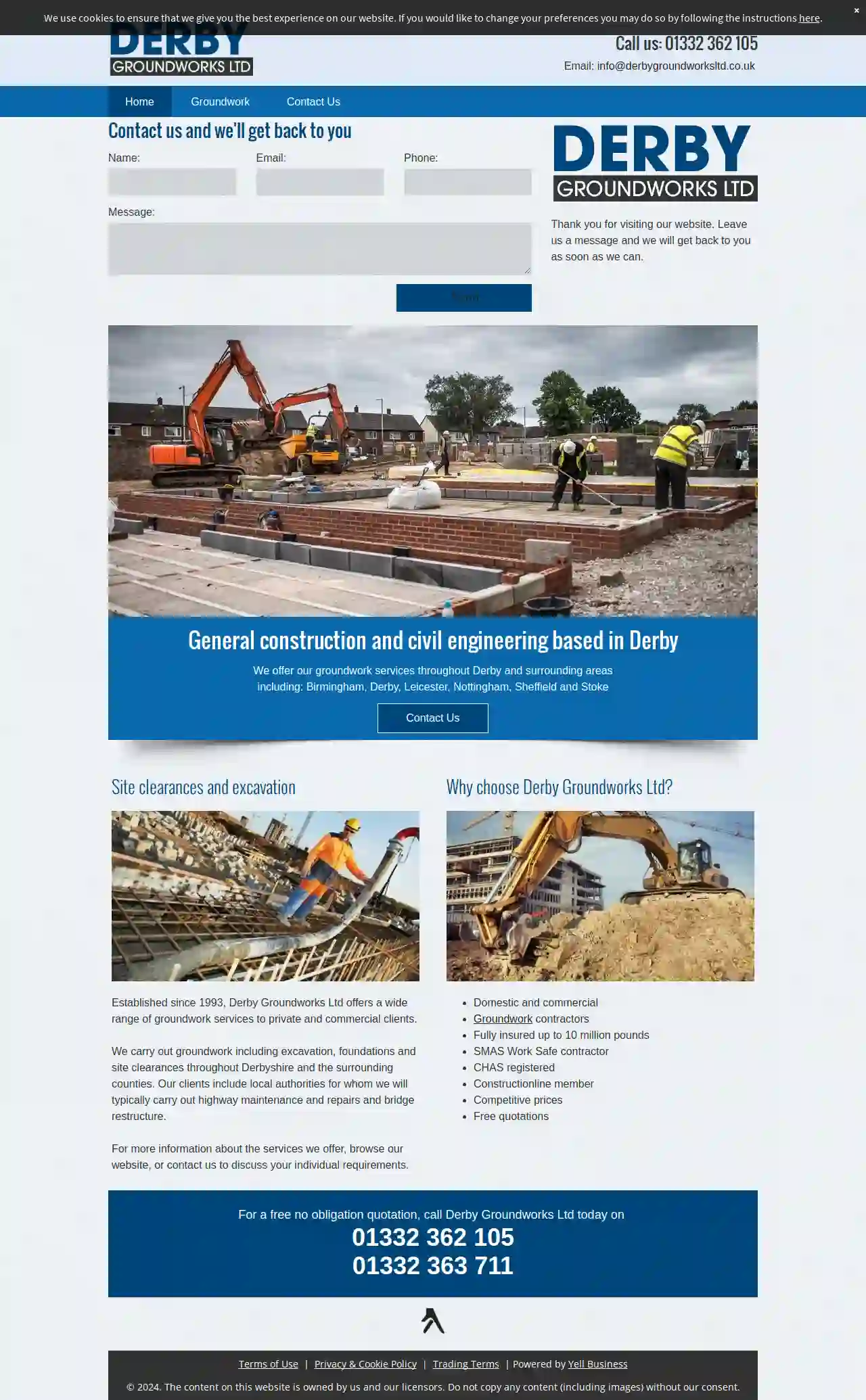Excavation Contractors Codnor
Find top Excavation Companies in Codnor
Receive multiple Land Excavation quotes for your project today! Compare profiles, reviews, accreditations, portfolio, etc... and choose the best offer.

GB Groundworks and Construction Ltd
44 reviews285 Ringinglow Rd, Sheffield, S11 7PZ, GBWelcome to GB Groundworks We are a small construction company with a focus on quality and delivering niche projects. Grounded in excavation and groundworks but with a family history of development we can offer the full package from breaking ground to completion in the commercial and domestic realms. We are experienced providers of solutions from design to final finish, incorporating piling, groundworks, foundations, extensions, new builds, landscaping, equestrian construction all completed with a high degree of skill and attention to detail. Commercially we’ve cut our teeth working in heavy industry factories installing machine bases, press pits, foundations and concrete tanks for production lines as well as welfare and Laboratory facilities. Domestically we undertake a diverse range of jobs from footings, drainage, landscaping, driveways, full extensions or just to damp packages, full new builds and more civil style works with retaining walls, rivers works, piling and concrete ring beams, fencing and basements. In the Equestrian field we work with domestic and commercial clients from menages, arenas stables, concrete yards, land drainage, fencing, field maintenance and more. We are currently having some email problems please use [email protected] to contact us.
- Services
- Why Us?
- Gallery
Get Quote
Arnold Excavation & Hauling, LLC
51 reviewsBatesville, GBArnold Excavation & Hauling, LLC Arnold Excavation & Hauling, LLC offers residential excavation and has been serving the area for over 30 years. Our reputation is built off of relationships with custom local builders, architects, landscape architects, homeowners as well as estate managers. We are a Class A Contractor, committed to providing high-quality excavation services to our clients in Albemarle County and the surrounding Charlottesville Metro Area. Our team is experienced in a wide range of excavation projects, including:
- Services
- Why Us?
- Gallery
Get Quote
Leedale Ltd
4.245 reviewsNottingham, GBAbout Leedale Leedale is a family-owned construction support services company established over 30 years ago. We are committed to providing our customers with the highest quality services at competitive prices. Our team of experienced professionals is dedicated to exceeding your expectations and ensuring your complete satisfaction. We offer a wide range of services, including tipper hire, grab hire, road sweeper hire, gully sucker hire, crane hire, plant hire, mini digger hire, plant transport, road haulage, screener & crusher hire, primary & recycled aggregates, land restoration, and soil sample testing. Our mission statement is our roadmap and outlines our purpose: Ensuring safety remains our number one priority Being the first-choice vendor or designated professional in our selected markets Exceeding the standards of our customers Ensuring our workers and those who work for us are valued We are proud to be a trusted partner to our customers and are committed to providing them with the best possible service. We are always striving to improve our services and offer new and innovative solutions to meet the ever-changing needs of our customers.
- Services
- Why Us?
- Gallery
Get Quote
Dean O'Neill Grab and JCB Hire - Nottingham & Mansfield
53 reviewsMansfield, GBAbout Us My company name is Dean O’Neil Grab and JCB Hire Ltd. I cover Nottingham, Derby and Leicestershire areas to provide the best possible service to my customers and clients. My business is operated to serve both residential and commercial contracts in the above mentioned East Midlands. Dean O’Neill Started working with his Dad many years ago when he was just 14. He worked his way up his fathers company by working in land scaping, fencing and patio and paving. Working hard and learning the ropes for the next 10 years Dean had learded all the main aspects of his Dads company. In this time Dean had moved on to pricing and quoting as well as completing the work as his Dad slowed down a little. Dean decided to widen his skills and went down the academic route at Basford Hall College to qualify in Brick laying and plastering to NVQ level 3. Moving on he trained further and now works as a qualified JCB driver with his CITB licence. He also oporates a 360egree machine above 5 tonne. Dean and his family have working links to Nottingham for over 80 years through Mapperley Landscapes and O’Neill tippers.
- Services
- Why Us?
- Our Team
- Gallery
Get Quote
Pickford Contracting Ltd
53 reviewsSledbrook Farm, Sheffield, S36 4HF, GBPickford Contracting Pickford Contracting is a local business based in Sheffield, offering a range of services to meet your needs. We are committed to providing high-quality workmanship and excellent customer service. Our Services We offer a wide range of services, including: General building work Extensions and conversions Renovations Landscaping And more! Our Team Our team of experienced and qualified professionals is dedicated to providing you with the best possible service. We are committed to working closely with you to ensure that your project is completed to your satisfaction. Contact Us If you are looking for a reliable and experienced contractor, please contact us today for a free quote.
- Services
- Why Us?
- Gallery
Get Quote
Drainage Bexleyheath - Blocked Drains
51 reviews299A Broadway, Bexleyheath, DA6 8DG, GBDrainage Bexleyheath: Your Trusted Drainage Experts As Bexleyheath's largest and most respected privately-owned drainage contractor, we offer a comprehensive range of domestic drainage services. Our skilled engineers handle everything from clearing blockages and repairing pipes to essential maintenance, ensuring your plumbing remains in optimal condition with minimal disruption. Advanced Technology for Efficient Solutions Our qualified engineers use the latest technology and innovative methods, such as no-dig repairs and pipe relining, to efficiently resolve all drainage needs. This ensures high-quality service and a clear, fully functional drainage system with minimal disruption to your daily life.
- Services
- Why Us?
- Gallery
Get Quote
BD Yates Construction Ltd
56 reviewsBens Barn, Main Street, Elton, DE4 2BW, GBAn established construction firm based in the heart of the Peak District National Park. We pride ourselves on the quality of our work and our trademark friendly and professional service. Having been working within a partnership for the last 20 years, we have built on the experience and knowledge from a well-known family business which cater for all types of Construction and Groundworks. We have over 20 years experience in new builds and extensions within the Peak District National Park and Derbyshire Dales, so we have the ability to take any site from conception through to realisation meeting exacting standards. In addition to building work & alterations, all joinery work including kitchen fitting is carried out by ourselves to the highest standard to suit our customers style and taste. We have a vast amount of experience in Groundworks & Landscaping covering; Site preparation, Driveways, Patio’s, Services & Drains and all types of Excavation. We undertake a wide range of work from small scale projects for private customers to large scale commercial enterprises. Please see our up-to-date progress on our Facebook page. We pride ourselves on our Customer Satisfaction and always endeavour to ensure all work matches our exacting customer requirements. All our estimates are free and without obligation
- Services
- Why Us?
- Testimonials
- Gallery
Get Quote
S and G Mini Digger Hire
51 reviewsRotherham, GBTake the strain out of garden groundworking in Rotherham with S&G Mini Digger Hire Whether you're looking for mini digger hire, a dump truck to get some heavy work done, or a chainsaw to clear trees on your property; if you're looking for great prices on ground works vehicle and machinery hire throughout the Rotherham and Sheffield areas you should call S&G today. Setting a high standard for vehicle hire We all want our homes and gardens to look their best, but getting them that way can be back-breaking work. From fantastic fencing or demolishing unwanted buildings in your garden, to manned or unmanned mini digger hire; S&G have many ways to take the hassle out of having a handsome garden. Losing your mind over leaks in your home? Leaks in your water system could be wasting hundreds of your hard-earned pounds every year without you even knowing. That's why S&G have been carrying out leak detection for homeowners in throughout Rotherham and Sheffield for over 35 years. Call us today to track down those costly leaks.
- Services
- Why Us?
- Gallery
Get Quote
Derby Groundworks Lt
51 reviews119 Manor Road, DERBY, Derby, DE23 6BS, GBAbout Derby Groundworks Ltd Established since 1993, Derby Groundworks Ltd is a reputable general construction and civil engineering company based in Derby. We offer a wide range of groundwork services to both private and commercial clients throughout Derby and the surrounding areas, including Birmingham, Leicester, Nottingham, Sheffield, and Stoke. Our team of experienced professionals is dedicated to providing high-quality workmanship and exceptional customer service. We pride ourselves on our commitment to delivering projects on time and within budget, while maintaining the highest standards of safety and environmental responsibility. We specialize in a variety of groundwork services, including: Excavation Foundations Site clearances Highway maintenance and repairs Bridge restructure We are fully insured up to 10 million pounds and are proud members of SMAS Work Safe, CHAS, and Constructionline. We offer competitive prices and free quotations for all our services. Contact us today to discuss your individual requirements and receive a free, no-obligation quotation.
- Services
- Why Us?
- Gallery
Get Quote
PAVE WISE
3.37 reviews27 Cherry Orchard Mount, Nottingham, NG55TQ, GBWelcome to Pave Wise Based in Nottingham, Pave Wise are the No. 1 installers for driveways, patios and landscaping in Nottingham. We take great pride in providing a quality bespoke service whether laying a new driveway, patio or working on a landscaping project for residential or commercial customers. If you’re looking for block paving, gravel, resin bond or Tarmacadam get in touch, we promise you a competitive quote! We welcome any customer to inspect our past projects, to see first hand our high standards of workmanship. YOUR FIRST CHOICE FOR PAVING - LANDSCAPING - FENCING We use the best materials at every price point. You can be sure of a topnotch job whatever your budget. Driveways For Every Home When you choose a driveway contractor, you want to be certain you choose the right company that has the right skills and professionalism. The company that you choose must be reliable, trustworthy and dedicated to complete the work to your total satisfaction and within your budget and timescale. Our expert installers will walk you through the entire process. We begin with our initial, no charge, consultation. Once we have a good idea of your needs, we will begin drafting a design. This will include the materials used and advise the time frame of your project. Once we can agree on all parameters of your project, we get to work! Our staff is courteous, not only to you, but also your needs and your neighbors. We do our best to make sure your work is done professionally and quickly. Our speed is due to our high level of expertise. Rest assured, we do not cut corners on any project. The Benefits Improve the character of your home Add value to your property High quality material used Work fully insured and guaranteed for many years Complete customer satisfaction Range of colours, designs and patterns to choose from Completely free survey Free written quotation
- Services
- Why Us?
- Testimonials
- Gallery
Get Quote
Over 13,059+ Excavation Pros in our network
Our excavation companies operate in Codnor and surrounding areas!
ExcavationHQ has curated and vetted the Best Excavation Contractors in Codnor. Find the most reliable pro today.
Frequently Asked Questions About Excavation Contractors
- Project Size and Scope: The larger and more complex the excavation, the higher the cost.
- Soil Type: Different soil types require different equipment and techniques, impacting costs. Rocky or clay-rich soil can be more expensive to excavate than loose soil.
- Accessibility: Difficult-to-access sites might require specialized equipment or additional labor, increasing expenses.
- Disposal Costs: Hauling away excavated material (soil, rocks, etc.) to disposal sites incurs additional fees.
- Permits and Inspections: Depending on local regulations, permits and inspections might be required, adding to the overall cost.
- Sloped Property: Your property has a significant slope, making it prone to soil erosion or landslides.
- Creating Usable Space: You want to level off a sloped area to create a flat surface for patios, gardens, or other outdoor spaces.
- Preventing Damage: Erosion is threatening existing structures, driveways, or walkways.
- Landscaping Features: You're incorporating tiered gardens, raised beds, or other landscaping elements requiring soil retention.
- Project Size and Scope: Larger, more complex excavations naturally take longer.
- Soil Conditions: Rocky or challenging soil types can slow down progress.
- Site Accessibility: Limited access might require more time for maneuvering equipment and hauling materials.
- Weather: Inclement weather can cause delays.
- Permitting and Inspections: Waiting for permits or inspections can extend the timeline.
How much does excavation cost?
How do I know if I need a retaining wall?
How long does an excavation project take?
What is the difference between cut and fill excavation?
Cut: Involves excavating soil from an area where the existing grade is higher than the desired grade.
Fill: Refers to using the excavated soil ('cut' material) to raise the grade in an area where the existing grade is lower than desired.
This method minimizes the need to import or export soil, reducing costs and environmental impact. It's commonly used for site preparation, road construction, and landscaping.
How much does excavation cost?
- Project Size and Scope: The larger and more complex the excavation, the higher the cost.
- Soil Type: Different soil types require different equipment and techniques, impacting costs. Rocky or clay-rich soil can be more expensive to excavate than loose soil.
- Accessibility: Difficult-to-access sites might require specialized equipment or additional labor, increasing expenses.
- Disposal Costs: Hauling away excavated material (soil, rocks, etc.) to disposal sites incurs additional fees.
- Permits and Inspections: Depending on local regulations, permits and inspections might be required, adding to the overall cost.
How do I know if I need a retaining wall?
- Sloped Property: Your property has a significant slope, making it prone to soil erosion or landslides.
- Creating Usable Space: You want to level off a sloped area to create a flat surface for patios, gardens, or other outdoor spaces.
- Preventing Damage: Erosion is threatening existing structures, driveways, or walkways.
- Landscaping Features: You're incorporating tiered gardens, raised beds, or other landscaping elements requiring soil retention.
How long does an excavation project take?
- Project Size and Scope: Larger, more complex excavations naturally take longer.
- Soil Conditions: Rocky or challenging soil types can slow down progress.
- Site Accessibility: Limited access might require more time for maneuvering equipment and hauling materials.
- Weather: Inclement weather can cause delays.
- Permitting and Inspections: Waiting for permits or inspections can extend the timeline.
What is the difference between cut and fill excavation?
Cut: Involves excavating soil from an area where the existing grade is higher than the desired grade.
Fill: Refers to using the excavated soil ('cut' material) to raise the grade in an area where the existing grade is lower than desired.
This method minimizes the need to import or export soil, reducing costs and environmental impact. It's commonly used for site preparation, road construction, and landscaping.